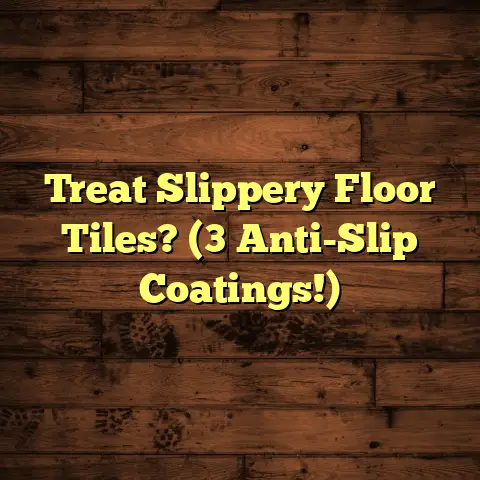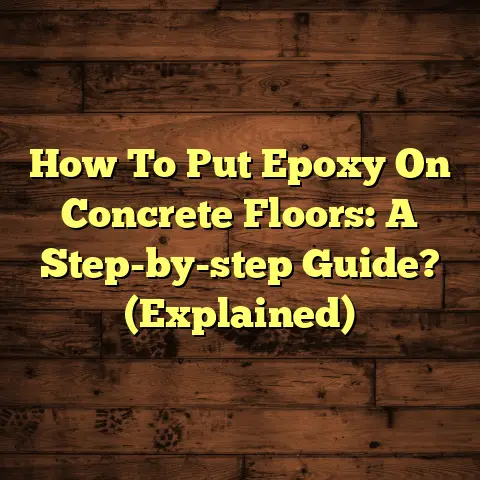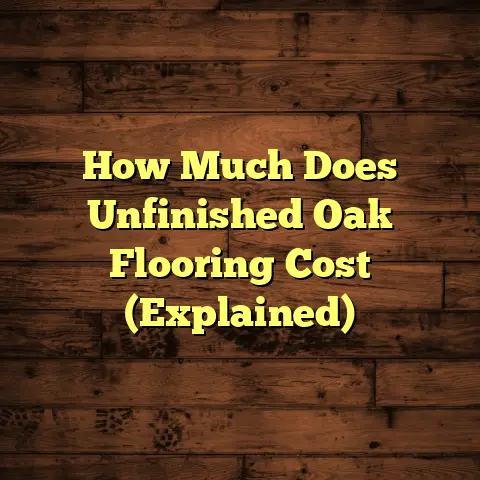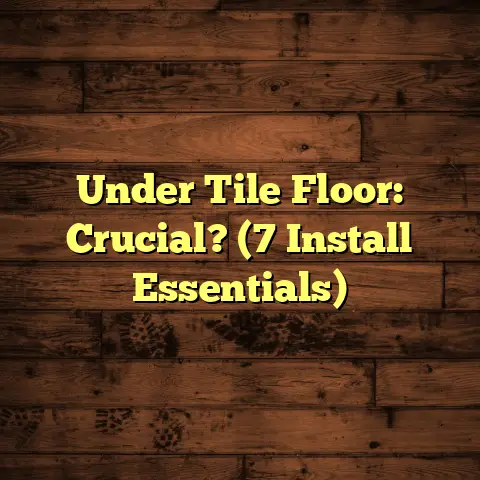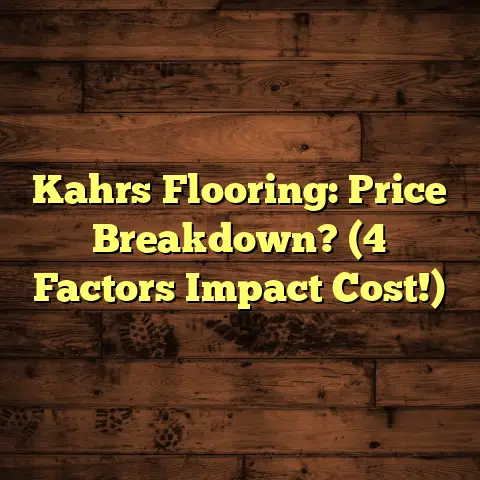Waterproof Hardwood Flooring? (Top 4 Options!)
I get it. As a flooring contractor for over 15 years, I’ve seen it all – from flooded basements to pet accidents. And let me tell you, the right flooring can make a HUGE difference, not just for your home’s look, but for your health.
We’re all becoming more aware of how our homes impact our well-being, right? Think about it: We spend so much time indoors. The air we breathe, the surfaces we touch – it all matters. And flooring? Well, that’s a big surface!
That’s why I’m so excited to talk about waterproof hardwood flooring. It’s not just a trend; it’s a game-changer. It gives you the beauty of hardwood with the peace of mind that comes from knowing your floors can handle whatever life throws their way. Especially if you have kids, pets, or anyone with allergies, choosing the right flooring is crucial.
So, let’s dive in and explore how waterproof hardwood can transform your home into a healthier, happier space.
Section 1: Understanding Waterproof
Hardwood Flooring
Okay, first things first: What exactly is waterproof hardwood flooring? It’s not your grandpa’s hardwood, that’s for sure.
Traditional hardwood, as beautiful as it is, is basically a sponge waiting to soak up any moisture. One spill, and you’re racing against the clock to prevent warping, staining, or even mold.
Waterproof hardwood, on the other hand, is engineered to resist water penetration. But how?
Well, it’s all about the construction. Here’s a breakdown:
-
Core: Most waterproof hardwood options have a special waterproof core. This is often made of materials like stone-plastic composite (SPC) or wood-plastic composite (WPC). These materials don’t absorb water, providing a solid foundation.
-
Top Layer: This is where you get the look of real hardwood. It’s usually a thin veneer of actual hardwood, giving you that authentic grain and texture.
-
Protective Coating: A durable, waterproof finish is applied to the top layer, sealing the wood and protecting it from scratches, stains, and, of course, water.
Think of it like a well-protected sandwich. The hardwood look is there, but it’s shielded by layers of defense against moisture. This construction offers a ton of benefits:
-
Moisture Resistance: Obviously! This is the biggest advantage. Spills, pet accidents, even minor flooding are much less of a concern.
-
Durability: The waterproof core and protective coating make these floors incredibly durable. They can withstand heavy foot traffic and resist dents and scratches.
-
Ease of Maintenance: Cleaning is a breeze! A quick sweep or mop is usually all you need to keep them looking their best.
Section 2: Health Benefits of Waterproof
Hardwood Flooring
Now, let’s get to the heart of why I’m so passionate about waterproof hardwood: the health benefits.
This isn’t just about having pretty floors; it’s about creating a healthier living environment for you and your family.
Indoor Air Quality
Think about what happens when water gets trapped under traditional flooring. It creates the perfect breeding ground for mold and mildew. And mold? That’s a nightmare for indoor air quality.
Mold spores can trigger allergies, asthma, and other respiratory problems. I’ve seen firsthand how moldy floors can affect people’s health, especially children and those with pre-existing conditions.
Waterproof hardwood eliminates this risk. Because it prevents water from seeping into the subfloor, it inhibits mold and mildew growth, leading to cleaner, healthier air.
According to the EPA, maintaining low relative humidity levels (below 60%) can help prevent mold growth. Waterproof flooring helps achieve this by not absorbing and retaining moisture.
Hypoallergenic Properties
Beyond mold prevention, waterproof hardwood can also reduce other allergens in your home. Traditional carpets, for example, can trap dust mites, pet dander, and other allergens.
Hardwood, in general, is a better option for allergy sufferers because it’s easier to clean and doesn’t harbor allergens as easily. Waterproof hardwood takes this a step further with its impermeable surface, making it even more resistant to trapping allergens.
I often recommend waterproof hardwood to clients with allergies, and they consistently report a noticeable improvement in their symptoms.
Safety and Comfort
Let’s not forget about safety! Wet floors are a slip-and-fall hazard, especially for young children and older adults. Waterproof hardwood, especially those with textured surfaces, can provide better slip resistance compared to smooth tile or polished wood.
And while it’s not as soft as carpet, waterproof hardwood can still be comfortable underfoot. Many options have a cushioned underlayment that provides a bit of give, making it more pleasant to walk on.
Section 3: Top 4 Waterproof Hardwood
Flooring Options
Okay, so you’re sold on the idea of waterproof hardwood. But with so many options on the market, how do you choose?
Don’t worry, I’ve got you covered. I’ve narrowed it down to my top four recommendations, based on my experience and the feedback I’ve received from countless homeowners.
Remember, not all waterproof hardwood is created equal. Each option has its own strengths and weaknesses, so it’s important to choose the one that best fits your needs and budget.
1. Luxury Vinyl Plank (LVP) with
Hardwood Look
LVP has become incredibly popular in recent years, and for good reason. It offers a fantastic combination of aesthetics, durability, and affordability.
Aesthetic Appeal and Versatility:
LVP can mimic the look of real hardwood incredibly well. Advancements in printing technology have allowed manufacturers to create realistic wood grain patterns, textures, and even varying plank widths. You can find LVP that looks like everything from rustic oak to sleek maple.
Waterproof Features, Durability, and Maintenance:
Most LVP is 100% waterproof, making it ideal for bathrooms, kitchens, and basements. It’s also highly scratch-resistant and easy to clean. A simple sweep or mop is usually all it takes to maintain its beauty.
Popular Styles and Brands:
- COREtec: Known for its innovative waterproof core and realistic wood looks.
- Shaw Floorté: Offers a wide range of styles and price points.
- Lifeproof (Home Depot): A budget-friendly option that doesn’t compromise on quality.
I’ve installed LVP in countless homes, and my clients are always impressed by its performance and appearance.
2. Engineered Hardwood with
Waterproof Core
This option gives you the best of both worlds: the authentic look and feel of real hardwood with the added protection of a waterproof core.
Construction for Enhanced Stability and Moisture Resistance:
Engineered hardwood consists of a thin layer of real hardwood veneer bonded to multiple layers of plywood or fiberboard. This construction makes it more stable and less prone to warping than solid hardwood.
The waterproof core, typically made of SPC or WPC, provides an additional layer of protection against moisture.
Benefits of Waterproof Core and Suitability for Various Climates:
The waterproof core makes this option suitable for areas with high humidity or potential for spills. It’s also a great choice for homes in climates with significant temperature fluctuations, as it’s less likely to expand and contract like solid hardwood.
Notable Brands and Product Lines:
- US Floors COREtec Wood Pro: Combines the COREtec waterproof technology with a real hardwood veneer.
- Shaw Repel Hardwood: Offers enhanced water resistance and a variety of wood species and finishes.
- Mohawk RevWood Plus: Features a waterproof surface and a locking system that prevents water from seeping between planks.
I often recommend engineered hardwood with a waterproof core to clients who want the look of real hardwood but need the added protection of a waterproof floor.
3. Waterproof Laminate Flooring
Laminate flooring has come a long way in recent years. Waterproof laminate offers an affordable and stylish alternative to traditional hardwood.
Definition and Differences from Traditional Laminate:
Traditional laminate flooring consists of a particleboard core topped with a decorative layer and a protective wear layer. Waterproof laminate takes this a step further by using a water-resistant core and a tighter locking system to prevent water from penetrating the seams.
Affordability, Range of Styles, and Resistance to Water Damage:
Waterproof laminate is generally more affordable than engineered hardwood or solid hardwood. It’s also available in a wide range of styles, colors, and textures, making it easy to find a look that complements your home’s décor.
While it’s not as durable as LVP or engineered hardwood, waterproof laminate is still resistant to scratches, stains, and water damage, making it a good choice for moderate-traffic areas.
Reputable Manufacturers and Their Best Offerings:
- Pergo Portfolio + WetProtect: Offers excellent water resistance and a variety of realistic wood looks.
- AquaGuard Laminate (Lumber Liquidators): A budget-friendly option with a waterproof core and a durable wear layer.
- Home Decorators Collection Water Resistant Laminate (Home Depot): Available in a wide range of styles and colors.
Waterproof laminate is a great option for homeowners who want the look of hardwood on a budget.
4. Treated Solid Hardwood Flooring
This is the most innovative and, in my opinion, exciting option. It takes traditional solid hardwood and treats it to make it water-resistant.
Advancements in Solid Hardwood Treatment:
New technologies have allowed manufacturers to infuse solid hardwood with special polymers that make it more resistant to water damage. These treatments don’t completely waterproof the wood, but they significantly reduce its ability to absorb moisture.
Aesthetic Advantages and Longevity:
Treated solid hardwood offers the same aesthetic advantages as traditional solid hardwood: natural beauty, warmth, and character. It also has the potential to last for generations with proper care.
Examples of Treatments and Brands:
- HydroShield Technology (Somerset Hardwood Flooring): Infuses the wood with a water-resistant polymer.
- AquaGuard Wood (Lumber Liquidators): Offers enhanced water resistance and a variety of wood species.
While treated solid hardwood is more expensive than other waterproof options, it’s a great choice for homeowners who want the authentic look and feel of solid hardwood with added protection against moisture.
Section 4: Comparing the Top 4 Options
Okay, let’s break it down. Here’s a comparison chart to help you see the key differences between these four options:
| Feature | Luxury Vinyl Plank (LVP) | Engineered Hardwood with Waterproof Core | Waterproof Laminate | Treated Solid Hardwood |
|---|---|---|---|---|
| Water Resistance | 100% Waterproof | 100% Waterproof | Highly Water-Resistant | Water-Resistant |
| Durability | Excellent | Very Good | Good | Excellent |
| Aesthetics | Excellent (Mimics Wood) | Excellent (Real Wood Veneer) | Good (Mimics Wood) | Excellent (Real Wood) |
| Cost | $$ | $$$ | $ | $$$$ |
| Maintenance | Easy | Easy | Easy | Moderate |
| Installation | Easy | Moderate | Easy | Difficult |
| Warranty | Varies by Brand | Varies by Brand | Varies by Brand | Varies by Brand |
Durability: LVP and treated solid hardwood are the most durable options, followed by engineered hardwood and waterproof laminate.
Maintenance: All four options are relatively easy to maintain, but treated solid hardwood may require more specialized cleaning products.
Warranty: Warranty coverage varies by brand and product line, so it’s important to read the fine print before making a purchase.
Installation Ease: LVP and waterproof laminate are generally the easiest to install, making them good DIY options. Engineered hardwood installation is a bit more complex, and treated solid hardwood typically requires professional installation.
Price: (Based on averages)
- Luxury Vinyl Plank (LVP): $3 – $7 per square foot
- Engineered Hardwood: $5 – $12 per square foot
- Waterproof Laminate: $2 – $5 per square foot
- Treated Solid Hardwood: $8 – $15+ per square foot
Conclusion
Choosing the right flooring is a big decision, but it’s one that can have a significant impact on your home’s beauty, health, and value. Waterproof hardwood offers a fantastic combination of aesthetics, durability, and health benefits, making it a great choice for families, pet owners, and anyone concerned about indoor air quality.
Remember, investing in the right flooring is an investment in your well-being. By choosing waterproof hardwood, you can create a healthier, more comfortable, and more beautiful home for years to come.
Call to Action
Ready to take the next step? I encourage you to do your research, visit local flooring showrooms, and talk to professionals. Get samples, compare prices, and ask questions. The more informed you are, the better equipped you’ll be to choose the perfect waterproof hardwood flooring for your home. Good luck, and happy flooring!
